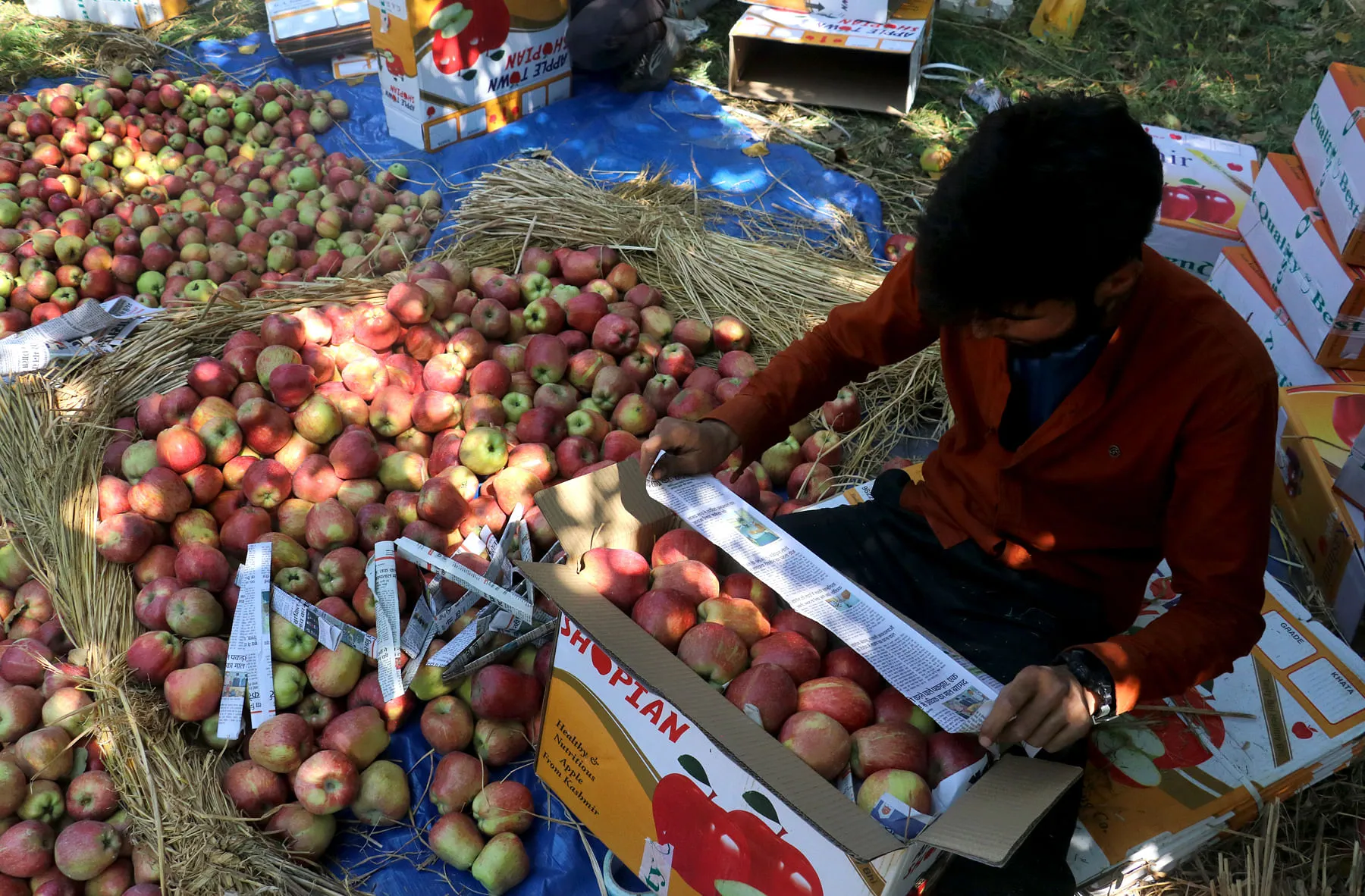Unfortunately, this year the apple industry has shown a downward turn, not in its production, but in terms of its marketing. The poor marketing of this fruit has been badly affecting the ruler economy; particularly the growers have to suffer the heavy losses.
This year hard labor and costly usage of pesticides and other chemicals has not paid dividends. On the other hand the fruit market, particular the apple market has almost collapsed and there is no such demand for apples.
In fact, there are wonderful varieties of apple available in the market but there are no genuine rates and sufficient buyers. The growers and fruit dealers have to face heavy losses.
The bumper produce of the fruit, poor road transport facilitates, heavy carriage charges and low purchasing power are cited as the main reasons for the collapse of this industry.
There may be certain political and administrative reasons responsible as well, for collapsing of this industry but I will say that in the race of cultivating commercialised fruits, the land has been losing several varieties of century’s old traditional fruits.
Indeed several mystics say it is the curse of the forgotten fruit varieties and the greed which is mainly responsible for this year’s low market for Kashmiri apples.

In fact, the fruit growers here have neglected their traditional fruit culture and have been merely dealing with more commercial ones which yield them quick benefits but not without hard labor and capital.
The land of Kashmir valley has got a suitable environment and climate, which helps it to produce variety of fruits, which are usually grown in cool and moderate temperatures.
Scores of varieties of apple, walnut, cherry, almonds, apricot, grapes and other fruits had been grown here and exported to other lands.
But from last few decades the apple has been grown here in abundance and that too in different updated varieties, like deliciou, kalu, krimzan and more recently Italian varieties have also been introduced.
This apparently growing apple industry has been changing the social and economic status of rural Kashmir. Indeed, it is good to promote the indigenous fruit culture of this land as the fruit Industry has been playing a vital role in developing the economy of the valley.
The commercial fruits are fetching a good income for the Kashmiri farmers and the trend has changed the life standards of Kashmiri villages. At many places the local farmer has discontinued the tradition of rice cultivation and grown orchards on agricultural lands. The superior qualities of apple and pear orchards are coming up on agricultural lands which have changed the life standard of an average farmer.
Thanks to new research that has paved way for the Kashmiri farmers to produce better quality of commercial fruits. But at the same time we should not neglect those traditional fruits which this land has been producing from ancient times.
We should also provide due space to those traditional fruits and revive their cultivation on our vacant lands. Although these may have less production and demand, but they very well suit our environment and would gradually also gain its market.
As we all know that the climate of Kashmir is such that it does not favor particular fruits which require warmer conditions to grow, we must understand that fruits which suit the environs here are to be grown in abundance.
To suit to its moderate climate and cold atmosphere the nature has bestowed this land with a variety of fruit cultures. The fruit cultivations which this land has been facilitating included Dhachh (grapes) Gilas (cherry) Baadam (Almound) and Chounth (Apple).
Therefore, by promoting their cultivation we can do well to our environment as well. Zchira (apricot) and Bihi which were cultivated in the mountainous belts of the valley suited well to the conditions were therefore grown in abundance in such areas.
Besides these traditional fruits, the land is capable of yielding good produce of walnut, apple and pear. Such fruits have been so favored that they are produced in dozens of varieties; the delicious Naakh varieties have also gained a wide market and are being exported to other Mandis of the country.
Among the ancient fruits of valley, Gilas is believed to have been brought to Kashmir from Turkistan. They would call it ‘Cerasus’ and it is said that Locutus (110 BC to 57 BC), the Roman general of the Sulla and Governor of Roman Asia carried a variety of this fruit to Italy.
Indo-Greeks are suggested to have brought it to Kashmir. However, the present variety of this fruit is not so old and it is said to have been imported from Kabul during the Mughal period.
Another ancient fruit of this land is called Dachh (grapes). The fruit has been cultivated since early centuries of the Christen era.
One of the motifs devised on the 2nd century tiles of valley is of branches of grapes which clearly suggest that the cultivation of the fruit has been in vogue in valley during the period and the motif has been familiar among the artists of the day.
These tiles which carried the motifs of this fruit are dated to 2nd century AD and discovered from the a Kushan era site of Dardkote Hutmur.
The apricot and almonds are both categorized into the group of dry fruits which were grown here in a larger scale. These fruits were also exported to other Asian and European Countries.
Almonds were grown in considerable quantity while as Khobani – apricot has been neglected here and it is now grown in parts of Ladakh. Almonds once became the identity of Kashmir and the motif has been very popular among maximum designers and displayed on a variety of Kashmiri artifacts more specifically on Kashmir textiles and metal works.
Unfortunately, the number of traditional fruits has gradually been decreasing. The land has already lost several old almond and apricot orchards.
Many places in Kashmir were named after such fruits like Dachigam, Dachinpur Baadam Bagh, Buadfimari, Baadam Pure etc. Alas! It is now confined to names alone while these orchards have disappeared from such places.
Kashmiri cultivator has been following the modern trends and techniques in both agriculture and horticulture.
He is preferring the varieties of commercial fruits like Pears and Apples after discarding the indigenous types as these fruit have helped cultivators to earn considerably well.
In fact it is not bad to promote more commercialised verities of the horticulture, but at the same time we should also not ignore the traditional verities of our horticulture sector.
Steps are needed to be taken to encourage cultivation of traditional fruits of Kashmir side by side with the more commercialized ones, otherwise these varieties would not stop to curse the fruit industry; this is what has happed this year.
Kushan era Terracotta tile depicting bunches of grapes, Daradkote lidder valley, 2nd century AD
DISCLAIMER: The views and opinions expressed in this article are the personal opinions of the author.
The facts, analysis, assumptions and perspective appearing in the article do not reflect the views of GK.







